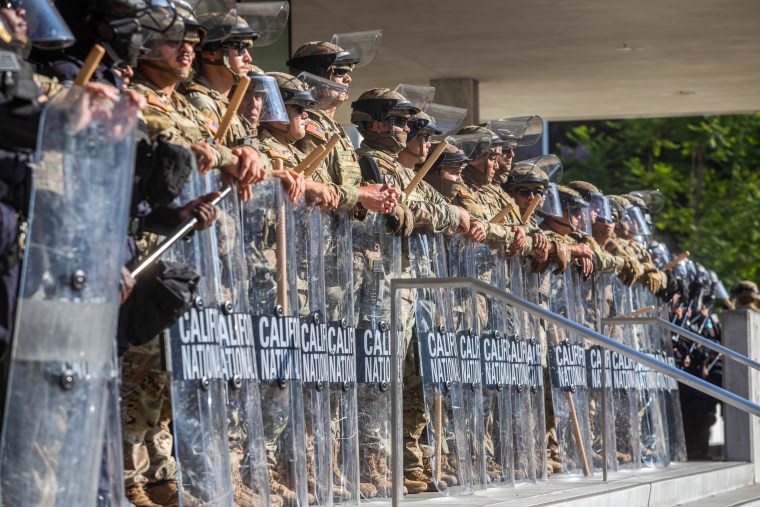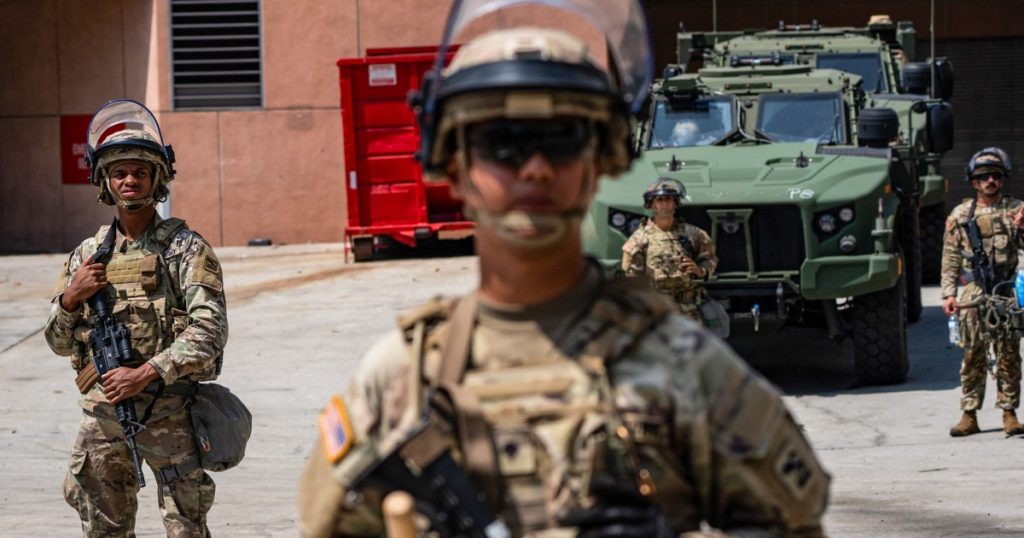WASHINGTON — President Donald Trump’s deployment of thousands of troops including 700 active-duty Marines to Los Angeles to quell protests is fueling concern that the Marines have not been properly trained for interacting with civilians, including children, during potentially tense law enforcement operations.
One of the duties of the Marines and National Guard troops will be to provide security for Immigration and Customs Enforcement personnel as they conduct immigration raids in the Los Angeles area, according to officials with knowledge of the operation and court filings. National Guard troops and Marines will transport ICE agents to and from raids and secure neighborhood perimeters while ICE agents conduct operations.
California Democrats argue that this violates the Posse Comitatus Act, an 1878 law that bars federal troops from participating in civilian law enforcement efforts. California Attorney General Rob Bonta argued in a court motion on Tuesday that the Trump administration’s deployment violates that law.
“The federalized National Guard and active-duty Marines deployed in Los Angeles will engage in quintessential law enforcement activity in violation of the PCA,” the motion said, referring to the Posse Comitatus Act. “Defendants will create a substantial likelihood that the military will physically confront, detain, or search civilians whom they perceive are posing a security threat, thereby actively executing civil laws.”
A military official with knowledge of the operation told NBC News that the Marines would not conduct arrests and would only transport and guard ICE agents. They said that these activities would not violate the Posse Comitatus Act.
As with many other political battles since Trump took office, the issue will be decided in court. On Thursday afternoon, U.S. District Judge Charles Breyer will hold a hearing in San Francisco to hear arguments from both sides regarding Trump’s use of the National Guard and Marines in L.A.
Breyer could accept or reject Bonta’s request that he issue a court order blocking the Trump administration from using National Guard troops and Marines during ICE operations.
Some local law enforcement officials and state Democrats say that Trump is stoking tensions rather than calming them. The National Guard is often used to respond to riots or violence on American streets. And active-duty Marines are not typically trained for domestic law enforcement and lack the tools or the training to respond to civil disturbances.
Mike Hillman, a law enforcement consultant, military veteran and former Los Angeles Police Department deputy chief who served more than 40 years in the department, said there is a big difference between what law enforcement does and what Marines do.
“The Marines are warfighters and they come with rules of engagement and tools and equipment that they would normally use under those circumstances,” Hillman told NBC News. “This situation has serious consequences. It puts the United States Marine Corps and the warfighters in the position where they are having to deal with domestic incidents on domestic soil.”
Concerns about Marine ‘rules of force’
Some of the Marines deployed to Los Angeles will provide security and transportation for ICE personnel as they conduct operations. This includes driving ICE agents in military vehicles to arrest locations, according to two sources familiar with the plans.
The Marines have been issued small cards that list “rules of force” — terminology used for domestic military operations, the two sources said. The cards describe what Marines are allowed to do during a deployment.

Two sources familiar with the planning say that ICE agents, as well as local officials in Los Angeles, have expressed concern about those rules of engagement. The sources said ICE agents worry that the Marines have not been properly trained and could be pulled into law enforcement operations for which local police or the National Guard is better suited.
Jim McDonnell, the Los Angeles police chief, said in a statement Monday that he was not notified of the Marine deployment and urged federal officials to maintain continuous communications with local law enforcement officials.
“The arrival of federal military forces in Los Angeles — absent clear coordination — presents a significant logistical and operational challenge for those of us charged with safeguarding this city,” he said. “We are urging open and continuous lines of communication between all agencies to prevent confusion, avoid escalation, and ensure a coordinated, lawful, and orderly response during this critical time.”
Warning from Rodney King riots
An incident in Los Angeles during the 1992 riots following the police beating of Rodney King serves as a cautionary tale. According to the book “Fires and Furies” by Maj. Gen. James Delk, who oversaw National Guard operations in California at the time, Marines caused an incident when they accompanied police officers to a domestic disturbance in the wake of the riots.
A police officer asked the Marines to “cover me” as he tried to enter the residence, according to the book. Instead of simply pointing their weapons at it to deter the people inside, the Marines opened fire on the house.
“The officer had not meant shoot when he yelled ‘cover me’ to the Marines,” Delk wrote. The officer meant, “point your weapon and be prepared to respond if necessary. However, the Marines responded instantly in the way they had been trained, where ‘cover me’ means ‘provide me with cover using firepower.’”
California legal battle
Bonta’s motion asked Breyer, the federal judge in San Francisco, to issue a temporary restraining order blocking the Trump administration from using National Guard troops or Marines during ICE operations.
“Defendants, including President Trump and Secretary of Defense Hegseth have sought to bring military personnel and a ‘warrior culture’ to the streets of cities and towns where Americans work, go to school and raise their families,” Bonta wrote.
On Tuesday, Department of Justice lawyers rebuffed Bonta’s motion. “Plaintiffs’ motion is legally meritless,” they wrote in a filing. “It seeks an extraordinary, unprecedented and dangerous court order.”
Bonta’s motion argued that the administration’s actions, in fact, were dangerous. “There is no invasion or rebellion in Los Angeles,” it said, “only the kind of civil unrest that occurs from time to time that is typically the purview of local law enforcement.”


